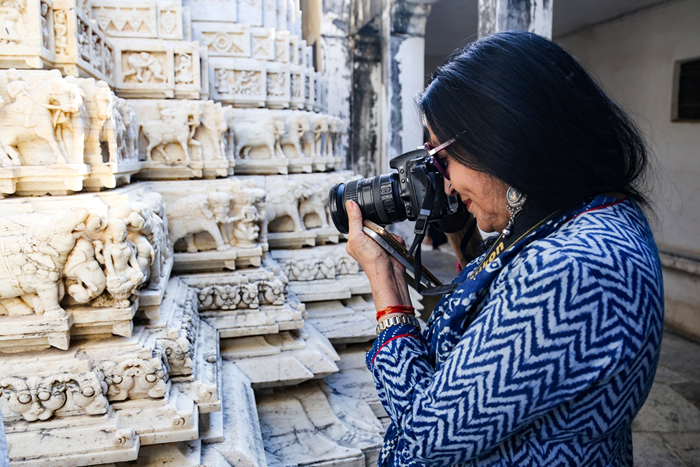— JASMEEN DUGAL
When I first heard that one of the sessions I would be attending at 'World Living Heritage Festival' in the historic City Palace Udaipur was ''Kahani, Parampara Aur Bhavishya: Oral Traditions, their role and impact'' by Tripti Pandey, it piqued my interest. For the uninitiated, oral tradition is a community's values, music, dance, folk ballads, rituals or story telling passed down by word of mouth from one generation to the next, giving it context and a ritualistic experience which bridges the past with the present. Its importance is not the cultural manifestation itself but the knowledge and values that are passed on. There are tradition bearers who doggedly go on inspite of the onslaught of digital media and their stories are a window to a world which is not only far from our everyday lives but makes us retrospect on a way of life which is fast disappearing in today's urban landscape. The need of the hour is to keep alive these traditions.
In the words of speaker Tripti Pandey — who completed Masters in History Of Ancient India And Indian Culture, studied tourism management in Salzburg and designed festivals involving India's rich legacy of folk arts and crafts, festivals and textiles — ''I feel all elements of living heritage celebrate life itself be it festivals, music, dance, folk ballads, rituals or story telling. India becomes 'Incredible India' only because of its vivid living heritage. Intriguingly, for us, talking about living heritage is a recent, and if I may say, an alien phenomenon, as our life so far has been deeply rooted in traditions, culture and celebrations. I have been drawn towards these elements right from my childhood inheriting stories and storyboards as we celebrated festivals at home as well as drawn by the traditions of different communities like the puppeteers, mahouts and snake charmers. It was much later that taking tourism as my profession led me to give a different interpretation to tourism which till that time was focusing on destinations i.e. tangible heritage. I was driven by my passion — the live elements of our traditions and culture — and the first milestone was 'The Desert Festival' in Jaisalmer. Interestingly, whatever I did or do today is with the same feeling to reflect on our living heritage, which is intangible. For years, the focus has been on the tangible i.e. the structures as against the intangible! So how do we take care of the living heritage that infuses life in and around those structures? How do we inspire the inheritors to inherit or to those who can hand over this invaluable heritage to pass on are questions that loom large before my eyes in today's times where people are centring their lives around social media and gadgets instead of coming alive to celebrate festive occasions and heading for recorded sounds instead of enjoying the live and spontaneous sounds that gave us such an immense repertoire of music and dance… for me, my base line is: Come Alive… Be Live!''
Her discourse left me with thoughts — 'What effort can be made on an individual level to preserve and pass oral traditions down generations?' In today's fast-paced urban life, can we carve out the time and make the effort to prevent oral traditions from becoming extinct? A concerted attempt is necessary on an individual level to reach out to elders in the family or to the community so that we may imbibe traditions… and encourage children to practice these ancestral traditions and subsequently pass it on to the next generation. The onus lies on each one of us. On a national level, however, oral tradition is important in maintaining cultural diversity in the face of globalisation. Each region must identify its oral traditions with keen participation from local communities and draw up inventories for conservation. In many regions, performing oral traditions is a specialised occupation and the community holds these performers in the highest regard as guardians of collective memory. The most important aspect of safeguarding ancient traditions is maintaining its everyday role in society… as living heritage; i.e. a way for the oral tradition to be preserved is by showcasing it, perhaps classical music concerts and folk dance at sightseeing destinations… if fifty per cent of the people present get engrossed or sing along, that itself makes the effort successful!!
 Tripti Pandey- Speaker- World Living Heritage Festival
Tripti Pandey- Speaker- World Living Heritage Festival
30-OCTOBER-2018
![]() 6 November 2018 8:10 am IN CONVERSATION WITH VRINDA RAJE SINGH
6 November 2018 8:10 am IN CONVERSATION WITH VRINDA RAJE SINGH
![]() 29 October 2018 1:13 pm IN CONVERSATION WITH CECILIE DE SAINT VENANT
29 October 2018 1:13 pm IN CONVERSATION WITH CECILIE DE SAINT VENANT
![]() 28 October 2018 12:43 pm IN CONVERSATION WITH SMITA SINGH
28 October 2018 12:43 pm IN CONVERSATION WITH SMITA SINGH
![]() 24 October 2018 1:35 pm ANCIENT TEMPLE CONVERSATION
24 October 2018 1:35 pm ANCIENT TEMPLE CONVERSATION
![]() 23 October 2018 3:42 pm IN CONVERSATION WITH LAKSHYARAJ SINGH MEWAR
23 October 2018 3:42 pm IN CONVERSATION WITH LAKSHYARAJ SINGH MEWAR
![]() 16 October 2018 1:47 pm ASHWA POOJAN
16 October 2018 1:47 pm ASHWA POOJAN
![]() 3 October 2018 1:36 pm CURTAIN RAISER
3 October 2018 1:36 pm CURTAIN RAISER
0 Comments